Colin Farrell Dead Man Down
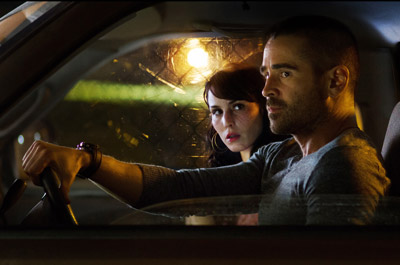
Dead Man Down
Cast: Noomi Rapace, Terrence Howard, Dominic Cooper
Director: Niels Arden Oplev
Genre: Action
Synopsis: Dead Man Down is a suspenseful action thriller, with a love story at its centre, set in the criminal underworld of New York City. Victor (Colin Farrell) is the right-hand man of an underground crime lord, Alphonse (Terrence Howard), who is faced with someone systematically killing members of his gang and sending him taunting and threatening messages. Darcy (Dominic Cooper), Victor's friend, who also works for Alphonse, becomes obsessed with finding out who the killer is in order to carry Alphonse's favour and rise in the organisation. In the midst of this, Victor meets Beatrice (Noomi Rapace), a mysterious French woman, who lives with her mother, Valentine (Isabelle Huppert), in the high rise apartment building opposite Victor's. As Victor starts to become attracted to her, he soon finds out that Beatrice is not the woman she seems to be, but rather a crime victim seeking retribution for which she needs Victor's help.
Release Date: May 2nd, 2013
About the Production
Explosive, emotional and darkly funny, Dead Man Down is an unusual combination: a gangster chronicle anchored in the story of Victor and Beatrice, each the survivor of a crippling loss, brought together by rage, grief and a thirst for vengeance. The screenplay by J.H. (Joel) Wyman, writer of the Brad Pitt-Julia Roberts adventure The Mexican and show runner for the cult-hit television series 'Fringe," percolated for six years as the complexities of the story and characters came together.
'Joel Wyman is a very meticulous writer," says producer Reid Shane, a partner with Joel Wyman in Frequency Films and co-executive producer of 'Fringe." 'He wouldn't release this script until he had all the intricacies of the characters worked out completely. Victor is a man of mystery. We aren't sure whether he's a good guy or a bad guy. He's done some terrible things. And Beatrice is very strange in her own way. They go off in a completely different direction than you expect." 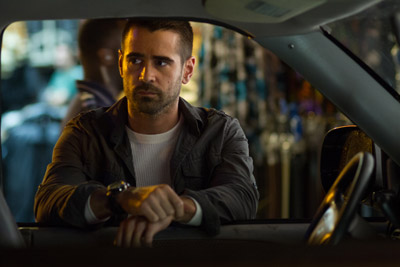 Joel Wyman was approached by Neil Moritz and Ori Marmur of Original Films to adapt a French thriller they were planning to remake as an American feature film. 'Joel Wyman came back and said, -I have a much better thriller that I'm working on right now,'" recalls Reid Shane. 'He gave them a copy of Dead Man Down."
Joel Wyman was approached by Neil Moritz and Ori Marmur of Original Films to adapt a French thriller they were planning to remake as an American feature film. 'Joel Wyman came back and said, -I have a much better thriller that I'm working on right now,'" recalls Reid Shane. 'He gave them a copy of Dead Man Down."
Ori Marmur, who became an executive producer on the film, was immediately intrigued. 'The screenplay was unique," he says. 'It's a revenge thriller, with a lot of unexpected twists and turns. We immediately fell in love with it because it was so different from any of the movies we'd made or that we saw in the marketplace.
'There are moments that are dark and edgy, there are moments that are scary, there are moments that are suspenseful," he continues. 'There's the struggle between the light and the dark in our two main characters, Victor and Beatrice. All of these great themes were embedded in the screenplay from the start."
Selecting a director for such unusual material was the subject of much discussion for Ori Marmur and his associates, but they always came back to the same name: Niels Arden Oplev, the Danish-born director who was catapulted to international fame in 2009 by the Swedish film The Girl with the Dragon Tattoo.
'We all really loved his work on The Girl with the Dragon Tattoo," says Ori Marmur. 'He brought a great look and sensibility and style to that film, as well as getting amazing performances from the actors. When we spoke with him about Dead Man Down, he had a clear and specific vision for this film, as well as great passion and enthusiasm for the script."
Following the critical acclaim and commercial success of the movie, Niels Arden Oplev had become a hot commodity in Hollywood. He was courted by the major studios and flooded with offers. He was eager to make his first American film, but he passed on a raft of high-profile screenplays before reading Dead Man Down. 'I read perhaps 250 scripts in two and a half years," says the director. 'A handful seemed interesting, but the script for Dead Man Down was nearly perfect. Joel Wyman wrote a fantastic script, there's no question about that. It has an enormous number of twists and turns. Just when you think you know something, something else happens that changes everything."
The director was drawn to what he says are all the ingredients of a classic and entertaining American film"revenge, action and a mysterious plot that unveils itself little by little. 'And inside this whole package is an unconventional love story that audiences have not seen before. The story has appeal for a wide audience, but at the same time, it has the potential for real artistic accomplishment. It is a fantastic mixture."
The theme of redemption, so central to this story, is one of Niels Arden Oplev's favourites. 'The story of Victor and Beatrice is very much about getting another shot at life," he explains. 'They meet in the heart of darkness. All the crazy things that happen from there bring them to a point where they are granted a second chance."
Once Niels Arden Oplev agreed to direct, the film became an even hotter property, attracting the attention of Stuart Ford, CEO of IM Global, who became an executive producer of the film and provided the financing. 'It is a smart, sophisticated thriller with real intelligence and an emotional pulse," he says. 'Audiences got to see a lot more of this kind of movie in the '70s, which I think was the heyday of this genre.
'The great action sequences, great villains and macho characters provide commercial appeal for the male action audience," says Stuart Ford. 'But it also has unexpected emotional appeal, which will bring in the more upscale audiences that loved Niels Arden Oplev' previous movies."
Niels Arden Oplev has a gift for creating suspense, observes Stuart Ford. 'But he also has real sophistication as a filmmaker and a storyteller. He is able to interweave a fairly complicated plot into a really satisfying feature film. He is very skilled at telling emotional stories, but with a lack of sentimentality. His unique visual style was another advantage. All of those qualities were fantastic ingredients to bring to the Dead Man Down mix."
An International Ensemble
Finding the right actors to play Victor and Beatrice sent the filmmakers on a global casting search that took them to Ireland, the United Kingdom, France and Scandinavia, as well as the U.S. 'One of the great things about Niels Arden Oplev is that when he locks into a specific actor, he doesn't back off," says Shane. 'One of his strengths is working with actors. He's resolute in his choices and he knew exactly what he was looking for."
Niels Arden Oplev's first choice for Victor was the Irish actor Colin Farrell. 'Neil Moritz and Ori Marmur were doing a film with him and suggested we consider him for the part," says the director. 'It sounded like a really cool and interesting idea. I met him in New York, and I immediately recognised his enormous dedication to doing something different with the material. He has an unusual emotional depth, and the kind of odd nuances and sensitivity that I was looking for in this character."
Farrell was working on Total Recall for Original Films when he received the script. 'We have a longstanding relationship with Colin Farrell," says Ori Marmur. 'He's a human chameleon. He bounces from big movies like Total Recall to critically acclaimed independent films like In Bruges to broad, edgy comedies like Horrible Bosses. He's had such an interesting career with films of incredible diversity, yet he doesn't feel overexposed."
Colin Farrell's ability to easily cross genres made him the number-one candidate for the role of Victor, says Stuart Ford. 'Colin Farrell is a rare actor. He is highly respected and popular with sophisticated audiences. At the same time, he has more than proven he's got the chops as an action hero as well."
In his initial discussions with the filmmakers, Colin Farrell impressed them with his sensitive take on tough-guy Victor. 'He saw clearly that Victor is a real person, not just an action hero," says the director. 'Victor's journey takes him from near total darkness into the light. He has the capacity for tough urban combat. He's driven by revenge to kill. But in this film, killing comes with a price.
'Colin Farrell was able to portray Victor as a hard case and yet, at the same time, maintain the emotional depth that was so important for the character," continues Niels Arden Oplev. 'We are able to believe the final outcome because we've sensed the turmoil beneath the surface. You could say that, through this ordeal, he becomes human again."
The overall script and the presence of Niels Arden Oplev as director captured Colin Farrell's attention, but the character clinched it for him. An engineer in his native Hungary, Victor uses his keen intellect and talent for detail to devise an ingenious revenge after his wife and daughter are brutally murdered.
'Victor came to the U.S. looking for a better opportunity," the actor says. 'Instead, everything that was stable and pure in his life is taken from him. When the film begins, he believes that he will never have any peace again in his life until he gets revenge for what he's lost."
The actor, who has played risk-taking characters on both sides of the law throughout his career, says he is drawn to stories where the stakes are high. 'If the law is being broken, it raises the stakes in a way that offers a very potent backdrop," Colin Farrell notes. 'Dead Man Down is set in the criminal underworld of New York, a dicey place to be. But the relationship between Victor and Beatrice is the lynchpin that sets this apart from other films. When they become involved in each other's lives, it becomes an unexpected chance for redemption."
The unlikely connection between Victor and Beatrice begins in a uniquely New York manner, 18 floors in the air, in opposing apartment towers. 'They live less than 30 yards from each other," says Colin Farrell. 'Their balconies face each other, which gives the relationship an air of voyeurism in the beginning. Victor has seen a woman looking at him; she's seen Victor looking at her. They've ventured a neighbourly wave toward each other. Eventually they go out for dinner and it's not the most successful first date. Something has taken place in Victor's apartment, something he would like nobody to know about. She tries to blackmail him into performing an act of violence on her behalf."
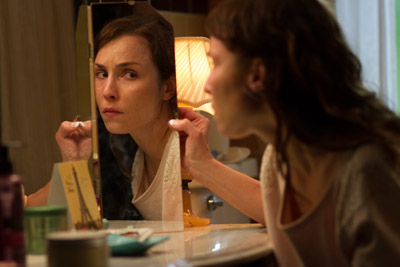 Beatrice is played by Noomi Rapace, the Swedish-Spanish actress who shot to fame after playing Lisbeth Salander, the memorable title character in Niels Arden Oplev's Girl with the Dragon Tattoo. 'Noomi Rapace is amazing to work with," says Colin Farrell. 'She's incredibly bright, insightful and bold. She's got a kind of emotional articulacy that challenges you as an actor in the loveliest way. Her interpretation of Beatrice is so specific and poetic. To stand across from her and do the work was an absolute joy."
Beatrice is played by Noomi Rapace, the Swedish-Spanish actress who shot to fame after playing Lisbeth Salander, the memorable title character in Niels Arden Oplev's Girl with the Dragon Tattoo. 'Noomi Rapace is amazing to work with," says Colin Farrell. 'She's incredibly bright, insightful and bold. She's got a kind of emotional articulacy that challenges you as an actor in the loveliest way. Her interpretation of Beatrice is so specific and poetic. To stand across from her and do the work was an absolute joy." The pair rehearsed for just three days in Los Angeles. 'It was short, but it seemed like we got a fortnight's worth of material out of it," says Colin Farrell. 'Joel Wyman, Niels Arden Oplev, Noomi Rapace and I went through it page by page. Niels Arden Oplev had his opinions, Noomi Rapace had hers and I had mine. Joel Wyman sat back and listened, because all his opinions were already in the script. I don't know that we made it better, but we gave it a more personal perspective in certain ways."
Working with Niels Arden Oplev was everything the actor had hoped it would be. 'Niels Arden Oplev and I developed a nice little shorthand," he says. 'He's relentless and uncompromising about the work, so I trusted that he'd never move on from a scene unless he was completely happy. Some directors leave actors alone, because they're more concerned with the technical aspects like composition, framing and camera movement. Niels Arden Oplev is very concerned with all of the above, but he is equally interested in the interaction between all the characters."
Niels Arden Oplev was primed to work with Noomi Rapace again after the success of their first feature and his suggestion to cast her as Beatrice was met with enthusiasm by the film's producers. 'Obviously, she already had a great relationship with Niels Arden Oplev," says Ori Marmur. 'We were thrilled when we sent her the script and she immediately responded to it."
Noomi Rapace has been on the fast track to international stardom since her astonishing three-picture arc in the Swedish version of Stieg Larsson's blockbuster trilogy. 'We got to know each other extremely well in enormously tough circumstances," says Niels Arden Oplev. 'I asked her to meet with Joel Wyman in Los Angeles, and, of course, she dazzled him. I knew she could bring the emotion and the depth, but what was really attractive for me was to use her in a role as far away from Lisbeth Salander as I could possibly imagine.
'Beatrice is a feminine French-American girl," Niels Arden Oplev continues, 'always manicured and in high heels, with beautiful hair. She is petite and fragile, but at the same time, she has this enormous anger and dark heart that allows her to do unimaginable things. She's not afraid of dying, which gives her a lot of power."
According to Stuart Ford, Noomi Rapace possesses just the right mixture of fragility and strength to make Beatrice a formidable adversary. 'She exudes a kind of bravery and pride, as well as beauty and sex appeal," he says. 'That's what attracts Colin Farrell's character to her."
'This script hit me straight in the heart," says Noomi Rapace. 'I grew up loving movies like True Romance and Natural Born Killers about twisted, deeply connected relationships between people on the edge. For me, this is a similar story, brutal and violent, but with a light inside. It's been many, many years since I have seen anything like it. We've got tough guys with lots of tattoos and guns and explosions and all that gritty, sexy roughness. But the heart of this movie is the emotion. The interaction between those two worlds is electric."
A car accident caused by a drunk driver has damaged Beatrice's once beautiful face beyond repair, but the psychological damage is even worse. She's become a figure of ridicule, mocked by the neighbourhood children as 'the monster." 'Her life stopped that day," says Noomi Rapace. 'She was used to getting everything she wanted by being the attractive girl in the room. In a heartbeat, everything was taken away. And now she doesn't know how to live. She doesn't know who she is.
'She's trying to find a way back, but her loneliness grows every day," the actress continues. 'Victor becomes the ticket out of her darkness. She has this whole plan. The first step is to charm him, then to get him to work with her on her road to revenge."
Beatrice and her mother live in a tiny French-accented bubble in their New York apartment, behaving as if time stopped before the accident. Until Victor enters their world, they are very much on their own.
'Beatrice and Victor are living parallel lives," says Noomi Rapace. 'When she sees him in his apartment, she feels a connection with him because she can clearly see that he's also lonely. He becomes an obsession for her. When she sees him do something extraordinary in his apartment, it should freak her out, but instead she becomes more fascinated. She convinces herself that he will stop her pain."
Noomi Rapace says that, like their characters, she and Colin Farrell connected immediately. 'I think our energies are quite similar in the sense that we never stop. We were immersed in Victor and Beatrice's world, living, breathing and thinking it. He's so sensitive and focused and committed, but wide open, without protection. That's the most beautiful thing you can experience as an actor."
Knowing Niels Arden Oplev would be at the helm of the film allowed Noomi Rapace to explore and experiment with confidence. 'When I heard that Niels Arden Oplev was attached to this movie, it seemed too good to be true," she says. 'We have an interesting chemistry. He knows I try to go as far as I can into it. He also knows that I'm quite stubborn in my opinions about my characters. He's like a hand grenade"very passionate and with a strong temper. His commitment is 150 percent and he can't compromise. It's not a choice; he doesn't have that filter."
Cast against type as Alphonse, the sinister, ruthless crime boss and Victor's unknowing nemesis, is Terrence Howard. 'Terrence Howard almost never plays bad guys," says Ori Marmur. 'He's always very sympathetic, or he's a seemingly bad guy who turns out to be a good guy. But in Dead Man Down, Terrence Howard is a really bad guy! He's very menacing and scary. Terrence Howard is a terrific actor and we really responded to his desire to shake things up and play a different kind of role.
Terrence Howard relished the opportunity to explore his dark side. 'I've been playing good guys for so long," he says. 'Sometimes it's necessary to see who you can be under uglier circumstances. Alphonse reminds me of a character in a Khalil Gibran story who has tried to do everything the right way, but doors keep slamming in his face. In the end, he decides that if he can't accomplish his goals by being a good man, he will become the worst criminal of all time."
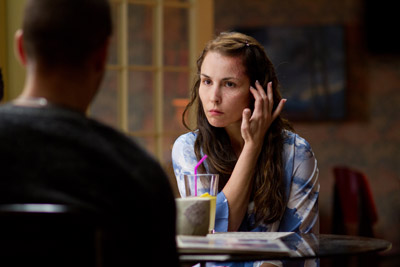 He sees Alphonse's choices as a sad commentary on humanity's lack of kindness and openness. 'Alphonse didn't start life saying, I want to kill. He was forced to fend for himself and began to work as a selfish entity. Tragically, he doesn't realise until almost the very end of the film that he has already lost all of his dreams. I believe that every character an actor plays is some unfinished version of himself. So as much as I enjoyed playing Alphonse, it was frightening to go to that place."
He sees Alphonse's choices as a sad commentary on humanity's lack of kindness and openness. 'Alphonse didn't start life saying, I want to kill. He was forced to fend for himself and began to work as a selfish entity. Tragically, he doesn't realise until almost the very end of the film that he has already lost all of his dreams. I believe that every character an actor plays is some unfinished version of himself. So as much as I enjoyed playing Alphonse, it was frightening to go to that place." There were several other motivators for Howard to tackle the role. 'Niels Arden has an eye for the imaginative, creative spirit," he adds. 'He tells such a simple truth in such a complex way. And I loved working with Colin Farrell on Hart's War and wanted to work with him again. His development of his characters and ability to uncover their subterranean layers is inspiring. He has so many wonderful ideas about the full arc of the characters together, not just his own. He looks at the whole film like a symphony, so to speak, and instead of just playing his violin, he has the entire orchestra in mind. There's a magic in him that I find invigorating."
Colin Farrell returns the compliments. 'Terrence Howard always comes to work," says Colin Farrell. 'His interpretation of Alphonse was not what I imagined. There's a level of fear and paranoia to the character that I find really interesting. Terrence Howard was very brave in investigating that.
'In one extremely tense moment, his voice is borderline cracking like he's fighting holding back his emotions," he continues. 'And yet he's deadly dangerous at that point. He's very measured and at the same time he hasn't relinquished the kind of rawness that audiences saw in him in Hustle & Flow."
The filmmakers also cast British actor Dominic Cooper against type when they tapped him for the role of Darcy, Victor's closest friend and an ambitious member of the gang. 'Dominic Cooper's character is unique for him," says Ori Marmur. 'He was in the middle of shooting Abraham Lincoln, Vampire Hunter when we approached him and, like other actors, he really responded to the material and gave us an immediate -yes.' It's really a challenging role for him and he brought fresh and original ideas to his interpretation."
'Dominic Cooper's a lovely actor," agrees Colin Farrell. 'I've seen him in so many things from An Education to Devil's Double, and his work is always spectacular. He's always interesting to watch and I was delighted to work with him."
Darcy is determined to find out who is threatening Alphonse in order to cement his place in the gang hierarchy, but he's unaware that the answer lies so close to him. 'People often talk about knowing that they want to take on a project after reading the first few pages of a script," says Dominic Cooper. 'That had never happened to me before this. But this was exactly what I had been looking for. It was wonderful to see a well-formed character with an unusual arc. He finishes in a very different place from where he began."
Darcy is not a typical gangster, according to Stuart Ford. 'He wants to provide for his family, so he's trying to move up in the world. He turns out to be the cleverest of the bunch, because he's the only one who manages to piece together the puzzle. Dominic Cooper is extremely refreshing in the role. He's gangster-as-Lower-East-Side-hipster, wearing suspenders with his pants hanging low. There's a boyish likability to him, as well as the feeling that he is truly dangerous because he's a guy with a gun on a mission."
Darcy opens the film with a touching and raw plea to his friend Victor about his trying personal situation, all while cradling his newborn baby. 'The juxtaposition of what he's saying and who he is doesn't seem to add up," says Dominic Cooper. 'I love that about the opening sequence. It sets him up as complicated from the beginning. He's capable of violence, but his need and desperation give you sympathy for him. He really wants to climb the ladder within this gang, without understanding how dangerous it, and that he's not really built for it. It all blows up in his face with an incredible twist in the plot, which I also love."
Dominic Cooper's admiration for his director is obvious. 'Niels Arden Oplev was so specific about the story being told," he says. 'Even with all the complicated action he had to get on film, he never for a moment let the acting go unchecked. Amidst the chaos unfolding on a set, it's often the last thing that gets considered. It was a very safe feeling to know how particular he was. There were sometimes heated discussions on set, but he always listened and took the time to consider."
The filmmakers scored a real casting coup for the role of Valentine, Beatrice's French mother. Through a combination of inspiration, tenacity and luck, they were able to snag legendary French actress Isabelle Huppert for a rare appearance in an American film.
'Isabelle was truly a great get," says Ori Marmur. 'She's French acting royalty. Niels Arden Oplev targeted her immediately. She was interested, but she has a very tricky schedule because she's in such great demand. She had to work us in between two different productions in France. It was a big deal"but well worth it. She elevates the role."
'Isabelle Huppert is absolutely magnificent in the film," says Niels Arden Oplev. 'She plays Valentine with such strange sweetness. Isabelle gives her a mysterious, dangerous undertone and a really loving heart. Valentine and Beatrice draw Victor under their spell and he becomes a little helpless when he's with them."
'A little bit of everything attracted me to this project"the script, the cast, the director," says Isabelle Huppert. 'Valentine represents an island of joy and comfort in Beatrice's life. The two of them live in a bubble, very protected after what happened to Beatrice.
'On the surface, she's light and cheerful, but underneath she's sad about her daughter's life," Isabelle Huppert continues. 'She wants her daughter to recover and have a normal life. Beatrice wants to protect her mother, too. It's quite moving in a sense, this relationship. They are waiting for something to happen, but they don't know what exactly. When Valentine sees Victor through the window, she knows by intuition that something could come from him."
Working with director Niels Arden Oplev was a pleasure for Isabelle Huppert. 'Niels Arden Oplev is very delicate, very precise and he's very open to any proposal," she says. 'He's ready to dig as far as possible into a scene. He has demonstrated a unique talent for mixing violence and introspection. There's action, but he lets the feelings and emotions of the characters come through. What I want to express on screen is life and working with a director like Niels Arden Oplev and actors like Noomi Rapace and Colin Farrell makes that possible."
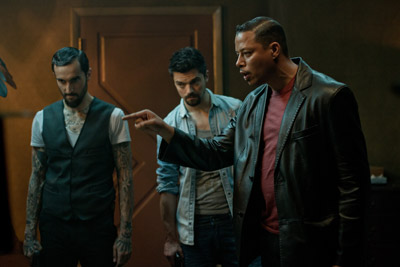 In the scene when Victor comes to the women's apartment for the first time, Isabelle Huppert found echoes of the beloved Tennessee Williams play, 'The Glass Menagerie." 'Actually, Renee Kalfus, the costume designer, called it to my attention," says the actress. There is this fragility and strangeness to the characters and the life they have constructed. Maybe I was in the middle of a Tennessee Williams moment, because I was playing Blanche Dubois in -Streetcar' at the time, but I thought it was a really good comparison. Each character is a bit broken. They're trying to recover, through a really dramatic situation."
In the scene when Victor comes to the women's apartment for the first time, Isabelle Huppert found echoes of the beloved Tennessee Williams play, 'The Glass Menagerie." 'Actually, Renee Kalfus, the costume designer, called it to my attention," says the actress. There is this fragility and strangeness to the characters and the life they have constructed. Maybe I was in the middle of a Tennessee Williams moment, because I was playing Blanche Dubois in -Streetcar' at the time, but I thought it was a really good comparison. Each character is a bit broken. They're trying to recover, through a really dramatic situation." Ori Marmur still marvels at the luck the filmmakers had getting all their first choices for the movie's major roles. 'Between Colin Farrell, Noomi Rapace, Terrence Howard, Dominic Cooper, and of course, Isabelle Huppert, Dead Man Down has a truly world-class cast," he says. 'I really can't say enough about them. They're all lovely people off the screen and they all put 100 percent of their ability on the screen."
The Girl Next Door
A full year before shooting began on Dead Man Down, director Niels Arden Oplev had already developed a clear visual style that he wanted to bring to the film, as well as a wish list of collaborators who could help him achieve it, according to Stuart Ford.
'That was really reassuring and it was a no-brainer for us to agree to surround Niels Arden Oplev with people he feels comfortable with," says the executive producer. 'Niels Sejer, the production designer, and Paul Cameron, the director of photography, shared his vision and brought real consistency and a specific identity to the movie that made it possible for us to make a film that has a fresh and idiosyncratic feel."
Adds Ori Marmur: 'From the very first meeting, he said he felt very strongly that the film should feel like real life"but just a bit off."
The idea of duality was key to his visual concept for the movie. 'Life has taught me that reality is a lot more peculiar than we think," the director says. 'There are distinctive elements in Dead Man Down that make it larger than life and a bit like a fairy tale, complete with the themes of violence and vengeance that are often found in those stories. There's a seductive quality in this tough and frightening world.
'I wanted a realistic, grainy looking film that would be at one with its universe. But I also wanted it to be beautiful with soft light and rich colours. When I am dealing with a topic that has a certain toughness, I think it is more interesting to make the world in which it is set quite beautiful, because beauty has a seductive quality that pulls you in. Niels Sejer and Paul Cameron have created intense beauty, even in the middle of a gunfight. It is a seeming contradiction to the subject matter and it adds complexity to the story."
In true digital-age fashion, Niels Sejer began his work on Dead Man Down remotely. 'I was in Copenhagen preparing for the movie while Niels Arden Oplev was in New York," he remembers. 'We did our planning on Skype and even did location scouting via Google Earth. I could sit in Copenhagen, looking up and down the streets of New York. I watched every possible gangster movie set in modern New York. For three months, we communicated without seeing each other and we actually got a lot of work done."
Niels Arden Oplev encouraged his collaborator to continue exploring some of the elements they worked with in their previous film. 'These are larger-than-life characters," says Niels Sejer. 'But we wanted to keep them real within the whole mythical universe of American gangster movies. He wanted to get into the mind of this man who's lost everything and is obsessed with revenge in a realistic and practical way."
It took a bit of serendipity to lead them to the massive apartment building where Victor and Beatrice's relationship begins. Niels Arden Oplev was living on Manhattan's Lower East Side, taking pictures of his surroundings and emailing them to Niels Sejer for reference. 'I was jogging one day when suddenly I saw this monster of a building, 20 floors and four towers on each side," he says. 'There were hundreds of apartment and each tower had a balcony that faced another. I nearly ran into a street lamp, because I was thinking, what if they each were on the balconies watching each other? And in the background, it is clearly New York. I felt it was a way to see the city in a way that I don't think people would think about New York."
The production designer, who had lived in Soho in the 1980s and was familiar with the area, was intrigued by the possibilities. 'Niels Arden and I are both fascinated with some of the same aspects of New York City," says Niels Sejer. 'We love the fact that New York is a port city. The water is everywhere, but you don't necessarily see it when you are living there. We love the bridges crossing in and out of Manhattan, those incredible steel structures and highway overpasses built on riveted steel. It's big, it's cinematic and it is quintessentially American."
The Lower East Side is the gritty, unglamorous side of Manhattan, but Niels Arden Oplev and Niels Sejer saw the potential in the setting. 'It can feel more like a documentary with thousands of people living on each block," the production designer says. 'But if you are up in one of those apartments, all of a sudden there is a whole spectrum of glamorous backdrops. You have the most incredible view of downtown Manhattan, looking across Essex Street, and seeing giant ocean liners stranded at the tip of the island, all of Wall Street and the Manhattan Bridge. Looking up at Midtown, you see the Chrysler Building and the Empire State. It seemed the perfect example of dualism."
The buildings were utilitarian, with few architectural details. 'The one thing they did have was balconies," says Niels Sejer. 'We imagined that all the initial contact between Beatrice and Victor was taking place through their windows and across the balconies. It allowed the director to create scenes of unusual intimacy."
The filmmakers began picturing the story as an urban fairy tale that takes place in the shadows of the iron bridge and in the apartments that float above the city. Violence begets romance and vice versa. 'The audience is poised on the edge throughout, looking at something beautiful just as it turns horrific," according to Niels Sejer. 'We used warm colours and flowered wallpaper to make it more accessible. People get shot in the head, but it's also seductive. We were looking for that dualism that comes when you make something beautiful and then set something truly nasty against it."
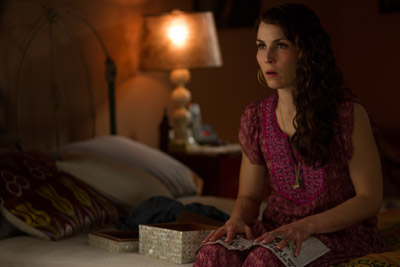 But when director of photography Paul Cameron came to see the building, he pointed out that for 90 percent of the day, the sun would not be in the right place for shooting. In order to realise their vision, the filmmakers decided to construct three floors of the building facade and the apartments on a soundstage.
But when director of photography Paul Cameron came to see the building, he pointed out that for 90 percent of the day, the sun would not be in the right place for shooting. In order to realise their vision, the filmmakers decided to construct three floors of the building facade and the apartments on a soundstage. 'That way, we could easily catch a little glimpse of Victor passing from his living room into the kitchen in the background of scene," says Niels Arden Oplev. 'Those kinds of shots are part of the whole fairy-tale feeling, as it's actually more than just real."
To make the backgrounds authentic, Paul Cameron shot massive plates of New York. 'I photographed rainy days, and cloudy afternoons, and nights with clouds and sodium light underlighting them," he says. 'We developed a whole world for these characters on those plates."
According to Ori Marmur, 'Paul Cameron added another layer of sophistication to the film with the stunning and original look he helped conceive and execute. We didn't have the traditional $100 million Hollywood tent-pole budget, but we still got that kind of look and vibe. Paul Cameron came in really excited about doing something different from his work on big movies like Total Recall. With minimal CG or visual effects, he and Niels Arden Oplev created a real, cool throwback to the awesome movies of the '70s."
The script had all the elements needed for a very commercial, action oriented film, says Paul Cameron. 'But knowing Niels Arden's work from Dragon Tattoo, I knew he would bring something very special to the mix. And he did. He made a character-centric film that is both a revenge tragedy and a love story. I could see right away he and Niels Sejer would bring a very European sensibility to this and that was the right direction for me.
'Our main focus was to make a very realistic looking film with an edge of fantasy," Paul Cameron continues. 'The duality is present again in the contrast between the worlds of Victor and Beatrice. When you walk into Beatrice and Valentine's apartment, it's like a little piece of Paris on the Lower East Side. It's a slightly heightened reality, brighter and warmer compared to the rest of the world.
'When you step outside into the hallway, it is lit with fluorescent lights and so bleak," he continues. 'That carries all the way over to the next tower where Victor lives, which is very stark and without colour. It feels like Eastern Europe."
Crime boss Alphonse's house provides another texture for the film. The opulent mansion was also built on a soundstage to accommodate the film's explosive finale. 'When you see the film, you will realise that we had no choice but to build the house on a soundstage so it perfectly fit the action," says the director.
'It's very climactic ending," says Paul Cameron. 'It's late afternoon and the light is streaming into this rich, spotless interior, unlike the world that we've been in for most of the movie."
Niels Arden Oplev, Niels Sejer and Paul Cameron designed the mansion set together for the shots they knew they would need. 'Paul Cameron mounted the camera on a descender rig, which is a pulley system, that allowed us to move the camera up and down that central stairwell for some pretty incredible shots," says Niels Sejer. 'It was very efficient, because we didn't have to remount the camera for every shot and we could remote-control it."
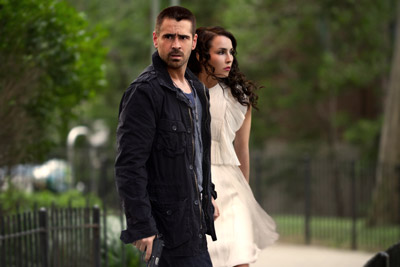 Niels Arden Oplev and his team pictured the house in Forest Hills, right at the end of Queens Boulevard. 'You turn a corner in a working class part of Queens and find yourself on wooded suburban streets lined with beautiful homes," he says. 'Alphonse is always beautifully dressed and has great taste, so of course he'd have an impressive home."
Niels Arden Oplev and his team pictured the house in Forest Hills, right at the end of Queens Boulevard. 'You turn a corner in a working class part of Queens and find yourself on wooded suburban streets lined with beautiful homes," he says. 'Alphonse is always beautifully dressed and has great taste, so of course he'd have an impressive home." Niels Arden Oplev sees Dead Man Down as a natural extension of his earlier work, an action- packed thriller with riveting characters that strives to cross genre boundaries and appeal to a wide audience. 'It dares to be commercial, yet at the same time it has a quality in its artistic expression that transcends that," he says. 'The violence and action are not there just to look good. It's there for a reason. These are real living, breathing characters who interact and interrelate and there's a story to each of the relationships in the film. We have made, in many ways, a classic old-school thriller with an original love story at the heart of it.
MORE
- Mission: Impossible Fallout
- Glenn Close The Wife
- Allison Chhorn Stanley's Mouth Interview
- Benicio Del Toro Sicario: Day of the Soldado
- Dame Judi Dench Tea With The Dames
- Sandra Bullock Ocean's 8
- Chris Pratt Jurassic World: Fallen Kingdom
- Claudia Sangiorgi Dalimore and Michelle Grace...
- Rachel McAdams Disobedience Interview
- Sebastián Lelio and Alessandro Nivola...
- Perri Cummings Trench Interview



